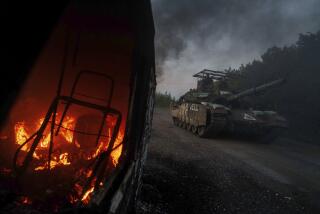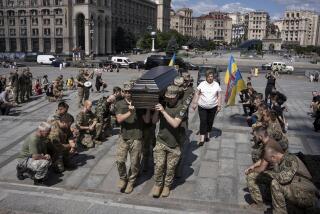Road to Safety Fraught With Peril in Chechnya
- Share via
PERVOMAISKAYA, Russia — After sheltering in her basement for 40 days, 72-year-old Lydia Kobekova gathered her courage Thursday and fled the war-ravaged Chechen capital, Grozny. But on the road to escape, she said, Russian soldiers shot at her and her elderly husband.
Her face sagging with exhaustion and fear, and her worn coat spattered with mud, she stood at the Russian checkpoint at Pervomaiskaya, overlooking Grozny from the northwest. Behind her lay a sprawling panorama of destruction. Several huge columns of smoke rose from the burning city, and the shattering sound of artillery echoed through the hills.
Kobekova hid in her basement from Russian bombs and rockets until she heard on the radio that there was a safe corridor for civilians to leave the city. But she and other refugees who fled Grozny on Thursday said it was anything but safe.
“They were shooting at us,” Kobekova said of the Russians who have surrounded Grozny. “We thought we’d be killed.”
“It’s not a road of life--it’s a road of death. We barely got out of there alive. There’s no organized exit,” she said.
Walking five miles from Grozny to the checkpoint, Kobekova and her husband towed a small cart carrying their few remaining possessions: a pair of rubber boots, some clothes and a bag of potatoes.
Kobekova made her escape on a day that Knut Vollebaek, the chairman of the Organization for Security and Cooperation in Europe, was visiting the region to assess one of two refugee corridors declared by the Russian forces.
His visit came a day after a report that about 100 Russian soldiers were killed in Grozny when they were surrounded and attacked by Chechen rebel fighters. Nikolai P. Koshman, the Russian-appointed administrator for Chechnya, and the Russian military flatly denied the reports.
Alexander A. Zdanovich, a spokesman for the Federal Security Service--the main successor to the Soviet KGB--accused Western journalists who reported the clash of being agents of foreign intelligence services who want to make the Russian military look bad on the eve of Sunday’s national elections.
Russia lost its highly unpopular 1994-96 war in Chechnya, but this war campaign to recapture the separatist republic has been very popular with the public.
From where Vollebaek stood Thursday, Russia’s rejection of his call for a cease-fire was obvious. The boom of massive explosions could be heard.
Several women who fled Grozny in buses decked with white flags said Russians had fired on them too.
Satsita Jamaldinova, 37, said Russians shot at her bus, setting it on fire. The refugees, mainly women and children, had to take shelter in a ditch for 1 1/2 hours.
There were conflicting reports on casualties. Witnesses told Vollebaek, who is also Norway’s foreign minister, that several people were killed or wounded. Others, including Jamaldinova, said four were wounded. “We had to leave the bus and walk the rest of the way on foot,” she said.
Lela Abdulayeva, 32, fled Grozny several weeks ago but went back in search of several young relatives. She could not find them and said her bus, bearing a large white flag, also came under fire.
“People are frightened to get out. There are lots of people still there, including many children,” she said. Russian officials estimate the number of civilians still in the city at 40,000 to 45,000.
The refugees’ claims that troops shot at them followed several other incidents in which eyewitnesses have reported Russian forces firing at refugees or other civilians.
Koshman, who was present when the women told Vollebaek of the shooting, said that it was a provocation by Chechens but that it would be investigated.
Vollebaek called for a cease-fire of several days to let people escape and enable humanitarian agencies to go in and rescue the elderly and sick.
At the checkpoint, Russian soldiers searched the exhausted refugees and flipped through their belongings, including personal photographs. They said they were looking for people carrying photographs of Chechen rebel fighters.
Kobekova said her neighbors, still stranded in Grozny with children ages 2, 4 and 6, were desperate for a car to come to save them.
Tamara Boika, 63, a Russian who has lived in Grozny for 50 years, also walked out of the city Thursday.
“It’s terrifying,” she said. “They’re shooting and they’re killing, and they’re stealing everything. Anyone in a uniform comes and steals.” She spoke of the dire conditions in the capital, which lacked power, gas, food and water.
With the city cut off, there was no more clarity concerning the reports that a Russian armored column had been destroyed Wednesday.
“No destruction of an armored column has ever happened, simply because no armored column, or any other column, advanced toward Minutka Square through Grozny,” said Col. Gen. Valery Manilov, first deputy chief of the General Staff.
There was no official reaction in Moscow to a report by a Russian military news agency, quoting unidentified sources, that a clash had occurred in Grozny and that 50 Russian troops had been killed.
Grozny has been under long-range bombardment for months by Russian aircraft and artillery, but Russian officials have been reluctant to send in ground forces, fearing heavy troop casualties. Manilov repeated assertions that Russia has no plans to storm the city or conduct large-scale ground operations.
Both sides routinely exaggerate losses suffered by the other side and deny all but a minimum of casualties on their own. Both sides have also displayed dozens of bodies, claiming that they are those of rival fighters killed in battle.
In at least one such case, Chechen leaders released footage of an alleged battle scene in which the bodies appeared to have been moved after death. Russian officials later acknowledged that a reconnaissance patrol had been attacked in the area.
Russian officials have sent reconnaissance patrols into the besieged capital, presumably to probe the positions and strength of Chechen defenses.
Vollebaek flies to Berlin today to brief foreign ministers of the world’s leading industrialized nations.
Earlier, he toured a refugee camp, school and hospital in the village of Znamenskoye, about 35 miles northwest of Grozny. He called for the West to send more medical and humanitarian aid and urged Russia to allow the OSCE a bigger role in finding a political solution.
Russian officials reiterated that there could be no talks with Chechen rebels and said that Moscow’s military operation had to be completed.
Koshman and other Russian officials hosting Vollebaek also were keen to show off their efforts to restore services in the Russian-controlled northern sector. However, many of the refugees squarely blamed Russia for the war.
Lela Zhankatova, 48, a former radio journalist, left a bombed house behind in Grozny and came to the camp five days ago. “All I have left in my life is 50 rubles [about $1.90],” she said.
She blamed Russian President Boris N. Yeltsin and Prime Minister Vladimir V. Putin for the war and said the Chechen fighters were doing what they thought was right: defending their country.
“They love their people, and they love their motherland. When the planes come and bomb, they take up arms. They are hotblooded Caucasus people, and they don’t like to be insulted. I can understand them,” she said.
“But I would advise them to leave the towns. It’s a pointless war,” she said. “People just want peace. What really worries us is our country and the fate of our people.”
In Znamenskoye, schoolchildren sang Russian songs for Vollebaek and recited Russian poetry. They had posters of Russian poet Pushkin on the wall, and their schoolbooks were open to a Tolstoy story.
Headmistress Aishat Saipundinova said that, after the 1994-96 war, when Chechen forces drove the Russians out, classes were taught in Chechen and children also studied languages like Arabic. Some of the students do not speak Russian.
The headmistress encouraged the children to ask the visitors for sports equipment and musical instruments.
“Tomorrow, Grandfather Frost will come,” Koshman said, referring to the Russian Santa Claus, who comes on New Year’s Eve. He said the Russian government would hand out 100,000 presents to children.
*
Times staff writer Maura Reynolds in Moscow contributed to this report.
More to Read
Sign up for Essential California
The most important California stories and recommendations in your inbox every morning.
You may occasionally receive promotional content from the Los Angeles Times.













